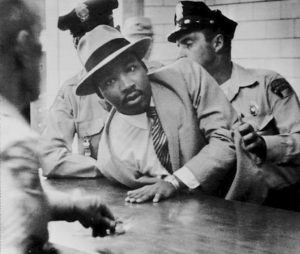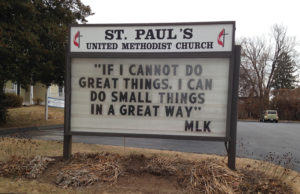What Exploiting a Whitewashed MLK Says About You
 Dr. Martin Luther King Jr. was arrested in Montgomery, AL in 1958.
Dr. Martin Luther King Jr. was arrested in Montgomery, AL in 1958. January 18, 2021 — In recognition of Martin Luther King, Jr. Day we are reposting this article on understanding King’s real legacy by Sincere Kirabo, the former social justice coordinator at the American Humanist Association. The article was originally published on January 15, 2018.
For years, Black writers, educators, and activists have gone out of their way to explain how the Dr. Martin Luther King Jr. often appealed to by white-dominated media sources, by right- and left-wing white politicians, and by white America in general is a mythologized figure whose quote-mined statements are used to reinforce a dominant racial ideology.
Since recently giving myself the invaluable gift of self-preservation by retiring from, as Reni Eddo-Lodge expertly articulates, trying to explain racism to white people, I’m going to instead highlight what white folks are telling the world by brandishing Dr. King’s bastardized words.
“I’ve never read, much less studied, Dr. Martin Luther King Jr.’s speeches in their entirety!”
 If you’re someone who employs slivers of Martin Luther King Jr.’s speeches in an attempt to “remind” people that he was all about racial colorblindness, congratulations, you’re openly confessing to the world that you know next to nothing about the full context of what King was talking about!
If you’re someone who employs slivers of Martin Luther King Jr.’s speeches in an attempt to “remind” people that he was all about racial colorblindness, congratulations, you’re openly confessing to the world that you know next to nothing about the full context of what King was talking about!
It’s true that King said he was hopeful that a day would come when people would be judged by the content of their character rather than skin color. Only, he was referring to a time in which racist ideologies and systems were dismantled. He was discussing an aspect of what a racially equal society would offer—at no time did he suggest people should try to realize this dream by “ignoring” skin color.
Anyone with a genuine interest in better understanding King’s race-conscious racial analysis and his body of work beyond kumbaya “love is all you need” snippets placed on loop by mainstream culture would see the folly of this “I don’t see race!” belief system.
In short, unfamiliarity with King’s full message and political activism leads to feel-good symbolism that acts as anti-black propaganda.
This propaganda is an act of “Columbusing” in how it appropriates and commodifies King’s image, erases his anti-establishment activism, and repurposes him into a “safe” emblem of respectability. Cornel West described this co-opting as an act of “Santa Claus-ification” in the way it grafts onto King’s legacy an honorific status that reduces him to a “Magical Negro” trope often invoked by those more concerned about maintaining social order than they are about fighting for and realizing justice.
It isn’t surprising that the insidious yet abominable idea of racial colorblindness is so appealing to white people. After all, the self-delusion of “not seeing race” is a convenient way of insulating oneself from race-based stress. Even so, racial avoidance and racial ignorance—which is precisely what racial colorblindness amounts to—isn’t equivalent to racial consciousness and anti-racist practices. The latter recognizes and subverts racism; the former necessarily ensures racism will continue.
“I believe MLK would want Black people to follow his example of peace and civility!”
Those who benefit from a status quo built upon and maintained by coercion and violence while advocating for peace that doesn’t upset the status quo is a cruel irony.
Once upon a time, Dr. King was considered dangerous and a criminal by the government and many white citizens—similar to how the government and many white citizens view outspoken Black individuals, groups, and organizations pushing for radical social change today.
Historian Jason Sokol wrote for the New York Times time last year pointing out this fact,
It is easy to forget that, until fairly recently, many white Americans loathed Dr. King. They perceived him as a rabble rouser and an agitator; some rejoiced in his assassination in April 1968. How they got from loathing to loving is less a story about growing tolerance and diminishing racism, and more about the ways that Dr. King’s legacy has been scrubbed and blunted.
Despite reality, people continue to co-sign and peddle a belief that King wasn’t just as indignant and radical as more modern Black liberation activists.
“I think that if people would just stop talking about racism, it would go away. Because magic.”
This is like you admitting to your friends that you believe the best policy for solving any and all problems within a romantic relationship and ensuring a healthy, long-term commitment is to never, ever discuss problems that may arise.
When this unconscionable advice is extended to fixing the social, economic, and political deprivations that have surgically targeted Black communities for centuries, it’s even more preposterous. And sure enough, some have found a way to rope MLK into this fanciful proposition.
One question that comes to mind in response to this tortured logic is: Why would someone who frequently emphasized how racism functions as a system, and that this system was preserved by white Americans who failed to recognize or put in the work to change this reality, agree that pretending these oppressive forces didn’t exist was a viable solution?
This was a man who, in his 1967 “Where do we go from here?” speech, said:
Why is equality so assiduously avoided? Why does white America delude itself, and how does it rationalize the evil it retains?
The majority of white Americans consider themselves sincerely committed to justice for the Negro. They believe that American society is essentially hospitable to fair play and to steady growth toward a middle-class Utopia embodying racial harmony. But unfortunately this is a fantasy of self-deception and comfortable vanity.”
King wasn’t the immaculate boy scout reimagined by and for the interests of white supremacy. He spoke to white America possessing a mutilated definition of equality. He spoke to racism being the way of life for the vast majority of white America. He was all about addressing racial injustice because he recognized that issues don’t magically solve themselves if they’re ignored. He realized the necessity of a process in which racism is confronted in order to be deconstructed in order to be diminished in order to be obliterated.
“I don’t know what I’m talking about and I’m totally okay with that!”
 When you exploit sanitized snapshots of Dr. King Jr.’s civil rights activism taught in grade school, you’re saying that you’re as content with your lack of knowledge as you are confident that what little you know outweighs the insight of those with a sound grasp on what he said and did and the socio-historical context that framed both.
When you exploit sanitized snapshots of Dr. King Jr.’s civil rights activism taught in grade school, you’re saying that you’re as content with your lack of knowledge as you are confident that what little you know outweighs the insight of those with a sound grasp on what he said and did and the socio-historical context that framed both.
Georgetown professor Michael Eric Dyson, for example, has discussed how Dr. King Jr.’s legacy has been severely whitewashed, noting how crucial it is to understand the fullness of his work beyond his “I Have A Dream” speech.
But he delivered other speeches. He said I saw my dream turn into a nightmare in another speech. He talked about the violence in American society and the refusal to acknowledge the humanity of black people. He talked about riots as the language of the unheard. He spoke to America the day before he was murdered and said, “America, all we ask is that you be true to what you said on paper.” He also began to say that most Americans were unconscious racists. He began to challenge the notion that America was a racially blind, racially neutral country and he began to argue that many Americans would not come to grips with their own racist beliefs, ideas, and practices.
That’s a much more radical Martin Luther King Jr. than we’re used to talking about and listening to, and only when we recover that King, will we recover the full dimension of his radical, if you will, position in America letters and certainly in American leadership culture.
In truth, Dr. King was assassinated twice: first literally, then symbolically. Those who perpetuate rhetoric that misappropriates the legacy of Dr. King Jr. are not only dead wrong, they also take part in this symbolic assassination and sully what he stood for.
